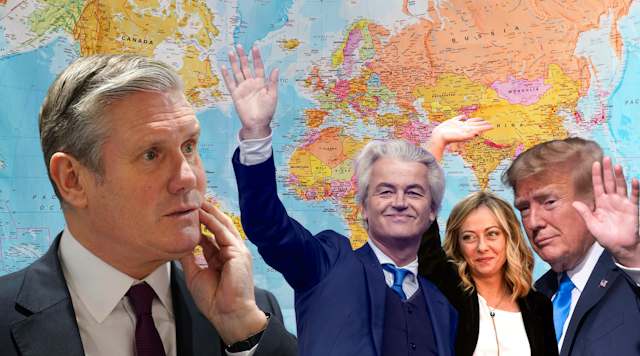British voters might have tired of the populist experiment that has strangled politics during the past few years, but, if he wins the next election to become UK prime minister, Keir Starmer will be be tested by a fresh wave of culture war distractions internationally.
Elections in Europe and the US in 2024 seem set to be dominated by divisive, self-styled anti-establishment candidates. And that has worrying implications not only for the UK, but also for the west’s shared interests in an increasingly unstable world.
Populism is experiencing a long drawn-out death in the UK. The country has lived with it since the Brexit referendum in 2016. It reached its political peak with the disastrous premiership of Boris Johnson, who rode roughshod over the constitution, and its economic nadir when Liz Truss and her chancellor Kwasi Kwarteng crashed the economy so spectacularly.
For a time, it looked like Rishi Sunak would present himself as the leader who would do the right thing, run things properly, clean up the mess left by his predecessors. But as his electoral fortunes continued to wane, Sunak has reverted to a sort of Johnson-lite culture war approach to politics, unconvincing but just as divisive.
Nailing his colours to the mast of the Rwanda policy is a case in point. Practically nobody thinks it is a workable policy (including Sunak himself when chancellor).
The idea to deport asylum seekers to Rwanda notably emerged in the dying days of Johnson’s tenure in Number 10 when “Operation Save Big Dog” spewed up a series of desperate, headline-grabbing proposals designed to shore up support for the ailing PM.
Populism limps on, but the general election looks set to deliver the death blow that will put it out of its misery. The task for Starmer, then, seems deceptively simple. His party is commanding a substantial lead in the opinion polls simply by being a credible alternative to a government widely believed to have failed.
Poll after poll shows the Conservatives terminally lagging the opposition – with some indicating near wipeout for the governing party. And if Starmer wins office, he will have the opportunity to deliver that final blow to an era of populism that has become so tiresome.
Greeting the neighbours
But just as Britain seems willing to rejoin the grown ups and ready to regain its reputation as a sensible country which respects the rule of law and its international obligations, many of its allies overseas are ramping up their flirtations with populism.
Were he to win the keys to Downing Street, this would be a major strategic challenge for Starmer’s new government. And it is a challenge made all the more acute by the increasing volatility in the world, whether that be in the shape of Russia, China or the Middle East and the threats they pose to security and the economy.
With Brexit estimated to be costing the British economy £100 billion a year in lost output, now would be a good time to reestablish constructive cooperation with the EU, working closer together for mutual economic and social benefit.

But so much for the hope London could normalise its relations with Brussels for the first time in a decade when one looks at the buildup to the European parliamentary elections. Far right, anti-European and populist parties across a host of member states are widely expected to win significant support, shifting the balance in the parliament and potentially the make-up of the European Commission.
In the nations of Europe there are nine parliamentary elections this year and populists are gaining ground across the continent. Austria and Portugal are likely to see a surge in right-wing support. Italy and the Netherlands have already seen their own.
Even those not holding elections in 2024, such as France and Germany, are enduring internal challenge. And then there is the US.
Read more: Look to the mainstream to explain the rise of the far right
There now seems very little standing in the way of Donald Trump securing the Republican nomination for November’s presidential election. There is still a long way to go before we see him back in the White House, but what seemed a laughable prospect not too long ago, now appears a realistic prospect.
And this time, Trump has scores to settle. He is no supporter of Nato, no fan of Ukraine and no sentimentalist about Europe. His instincts are isolationist, and his election would be destabilising to our continent.
These are the unstable circumstances that could surround the appointment of Starmer to the premiership. Having been seen as a clownish political basket case in recent years, no sooner has Britain thrown off the shackles of populism than it could be called upon to show lone leadership in the world. Starmer will need to defend Nato and stand up for Ukraine against political divisiveness. Let’s hope Starmer is up to the challenge.

